What are anxiety attacks?
Anxiety attacks are a way of labelling sharp spikes of anxiety.
Say you’re about to go over and talk to someone attractive and you’re worried that you’ll very quickly run out of things to say and look stupid.
Your anxiety goes into overdrive, releasing a boat-load of adrenaline to assist you in running in the opposite direction and avoiding any embarrassment.
This causes your heart rate and blood pressure to rise, breathing to quicken, and preps your muscles for action.
Sometimes people label this an anxiety attack.
Other times it’s called an anxiety episode, an acute anxiety episode, an adrenal spike, or high anxiety.

Now, you might be looking for information on panic attacks…
A Panic attack is when the adrenal spike pushes your body over 80% adrenal saturation and your prefrontal cortex gets shut down.
This cuts off your ability to think rationally for a few minutes and comes with really intense physical sensations.
If you’re after info on the difference between anxiety attacks and panic attacks, then check out this video.
Back to anxiety attacks
It can help to think about it like this…
Anxiety is the response we have to thinking something threatening is about to happen.
Anxiety attack is the label sometimes given when this anxiety response comes really fast and really intense!
Anxiety attack symptoms
What are the signs of an anxiety attack?
How do I know if what I’m feeling are anxiety attack symptoms? What about panic attacks? Are panic attack and anxiety attack symptoms the same?
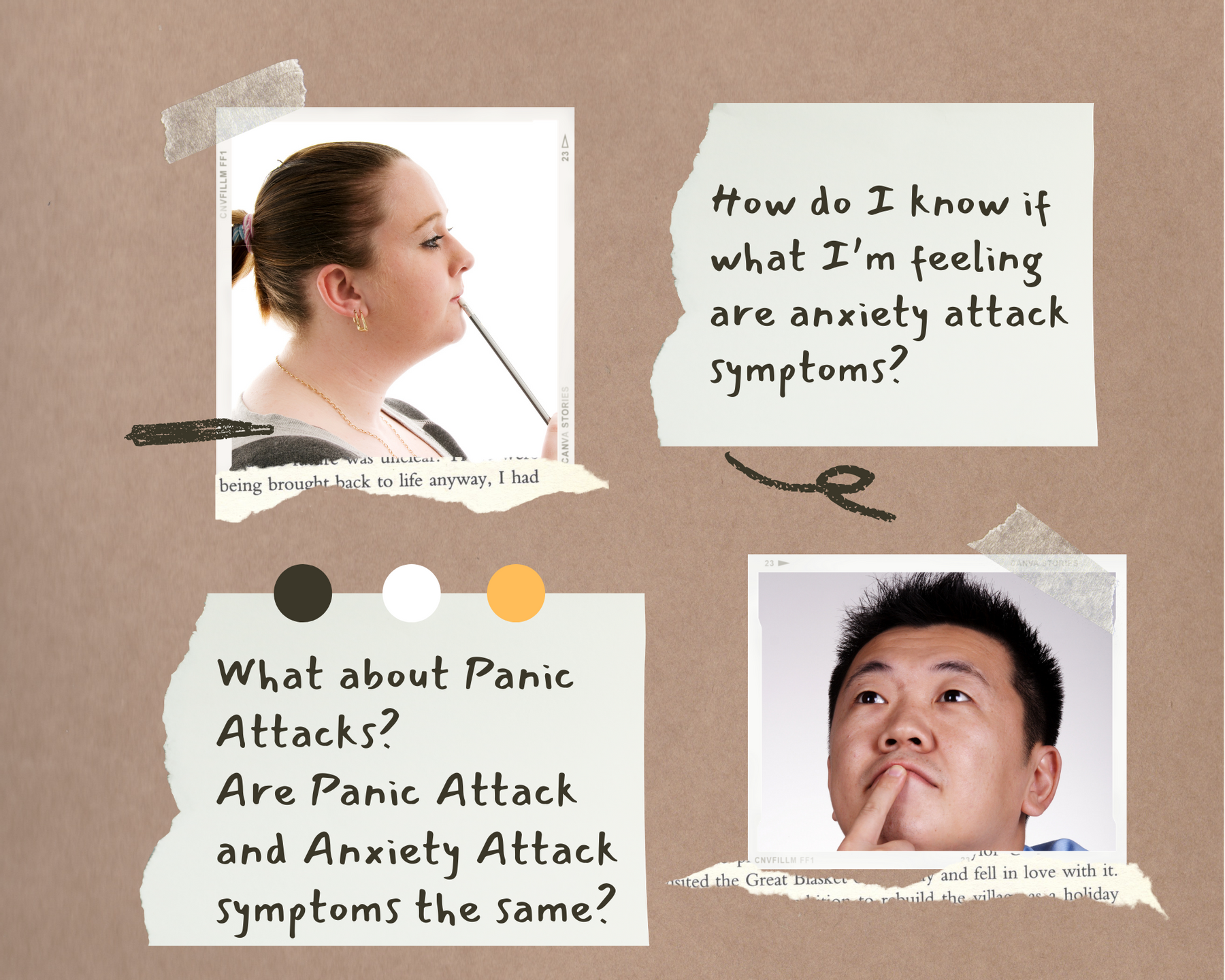
Anxiety can build gradually, sitting in the background.
Or if the situation you fear is more intense, or imminent, it can rise very quickly.
Sometimes being called an anxiety attack.
Anxiety Attack Test
You know you’re having an anxiety attack when…
Well, you don’t.
They’re not an officially recognized thing.
It’s a label that’s sometimes used because the feelings can be so intense.
If you call it an anxiety attack, then you’re having an anxiety attack.
That’s how it works.
People call it an anxiety attack when experiencing high levels of anxiety.
You’ll be feeling distress, apprehension and worry, restlessness.
You may notice your breathing and heart rate increase.
Digestion shuts down to divert energy to your muscles.
You get tense, tight and ready for action.
You may even get sweaty, or experience a dry mouth as your body prepares for danger.
These are all anxiety symptoms, sensations that come about as adrenaline and cortisol are released.
Once they subside, you’ll likely feel pretty tired and wrung-out, as it’s used up energy in an attempt to keep you safe and alive.
Panic Attack Test
Are these just the same as a panic attack?
Well, yes and no.
Panic attack is a term used to describe even higher adrenal release.
Some of the symptoms will be the same, but some new ones will appear at these higher levels.
The physical symptoms will also become more noticeable due to their intensity.
Your heart will be racing, your breathing ragged and ineffective-feeling.
Your extremities will get cold from blood being redirected to your muscles, while other parts of you may feel too hot.
There may be clammy sweat¸ chills and hot flashes.
Numbness and tingling.
Chest pain and a feeling that you’re chocking or have a tight throat.
You may be trembling or shaking, feel dizzy or even faint.
You could feel nauseous, or have a sore or upset stomach.
You may feel depersonalized from your body or the world around you.
And it will probably feel like a very violent and imminent death is swiftly coming right for you.
That’s a panic attack.
Like I said, these happen at higher levels of adrenaline and thus come with more intense physical symptoms.
Panic Disorder
Panic Disorder comes about when someone becomes afraid of having panic attacks and starts to avoid things so as not to trigger them.
If you’re wondering if you struggle with this, you can check out this video:
Anxiety attacks
generally come about from a known fear (you know what you’re afraid of - whether it’s public speaking, or rats).
Panic attacks
can sometimes come ‘out of the blue’ and you’ll have no clue what caused it.
I’ll cover what causes each type of attack in a later section.
What happens in an anxiety attack?
How long do anxiety attacks last? What can I expect during an anxiety attack?
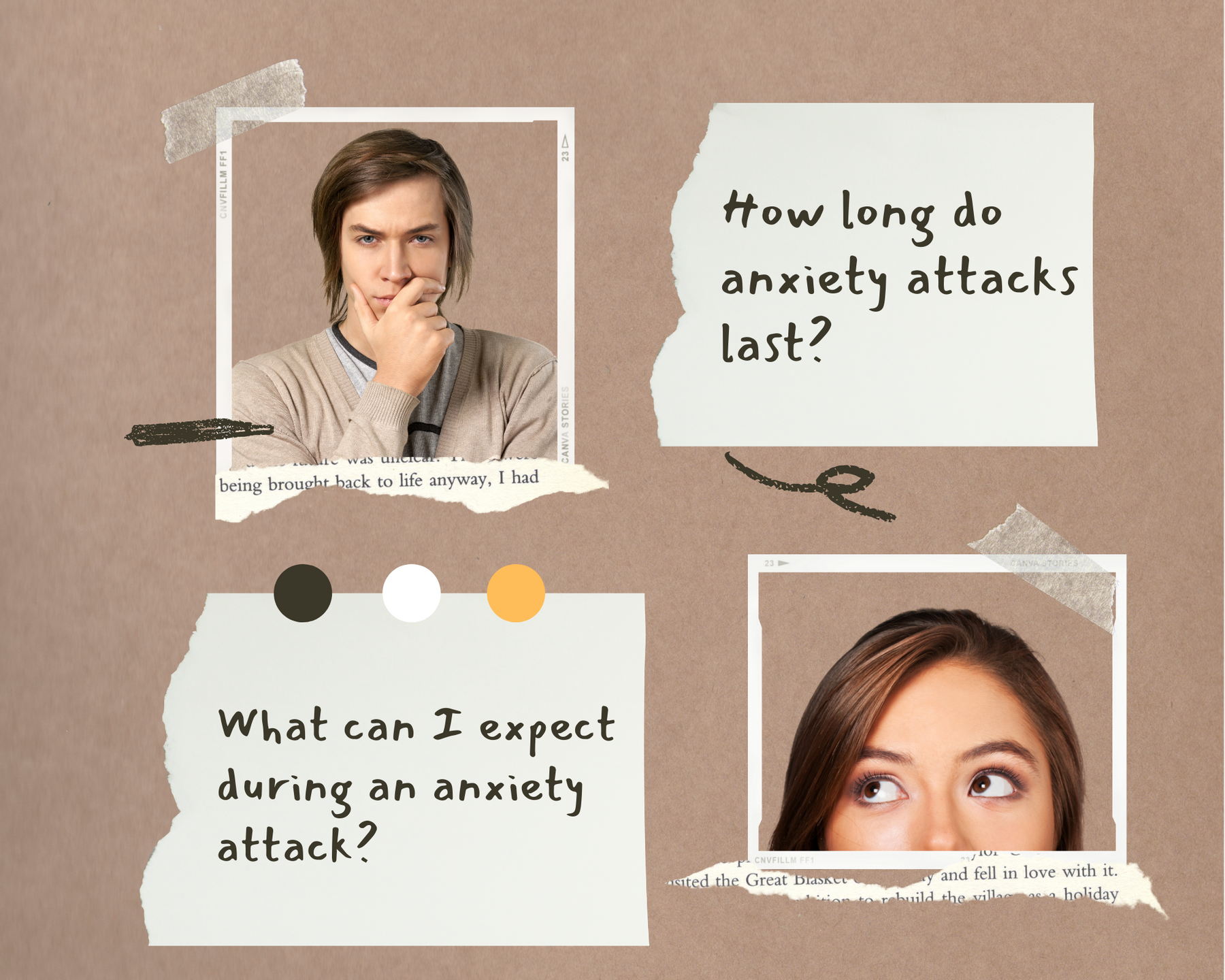
Anxiety attacks are acute periods of high anxiety.
What happens is, you might have been feeling a bit anxious about something coming up.
Maybe it’s a party, and you don’t know most of the people there.
Your anxiety rises to a crescendo as you actually hit the time of the party and...
this may get high enough that you label it an Anxiety Attack.

Compare this to Anxiety in general,
where it ebbs and flows,
or sits in the background feeling menacing.
Anxiety attacks are very high anxiety for a shorter period of time.
The Anxiety Journey
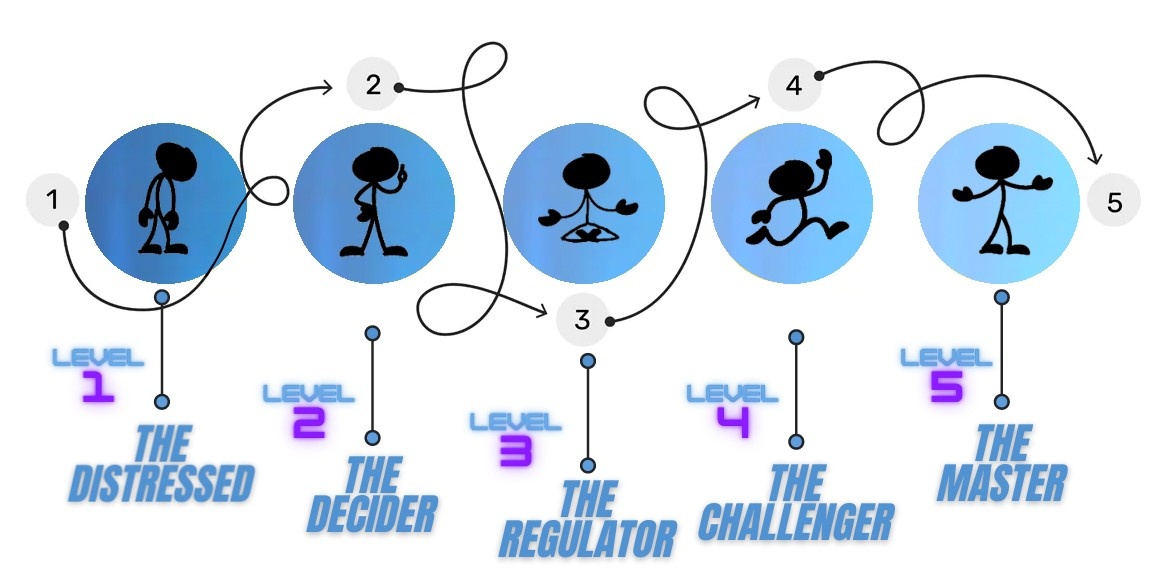
Different people experience anxiety, anxiety attacks and panic attacks differently.
Anxiety attacks are going to be more intense for people who haven’t started their journey to wellness.
We call this group - The Distressed.
Before we begin our journey to wellness, emotions feel very out of our control.
We’re just doing our best to avoid triggering any anxiety and any sensations associated with it.
The Distressed tend to believe they can’t do anything to cope with anxiety and may have thoughts like, “oh no, not this feeling!”
They don’t want to acknowledge that there’s something they can do because it feels so out of control and acknowledging that there are things we can do would invalidate that feeling.
Anxiety attacks, with their very high anxiety, are experienced as their uncontrollable emotions at their most overwhelming and most distressing.
Sometimes there are worries about it being something other than anxiety, like a health problem or a sign of going crazy.
Often it’s viewed as an inherent self-weakness.
A shame that can’t be improved, so must be hidden.
Which leads to low self-esteem and mood.
And anger at anyone who might suggest there is something that can be done about anxiety.
And, I get it.
Anxiety is intense and uncomfortable
And we get told all the time to
"Stop worrying"
"Calm down"
Which inherently comes with the message that anxiety is a bad thing that should be avoided.
We all start somewhere.
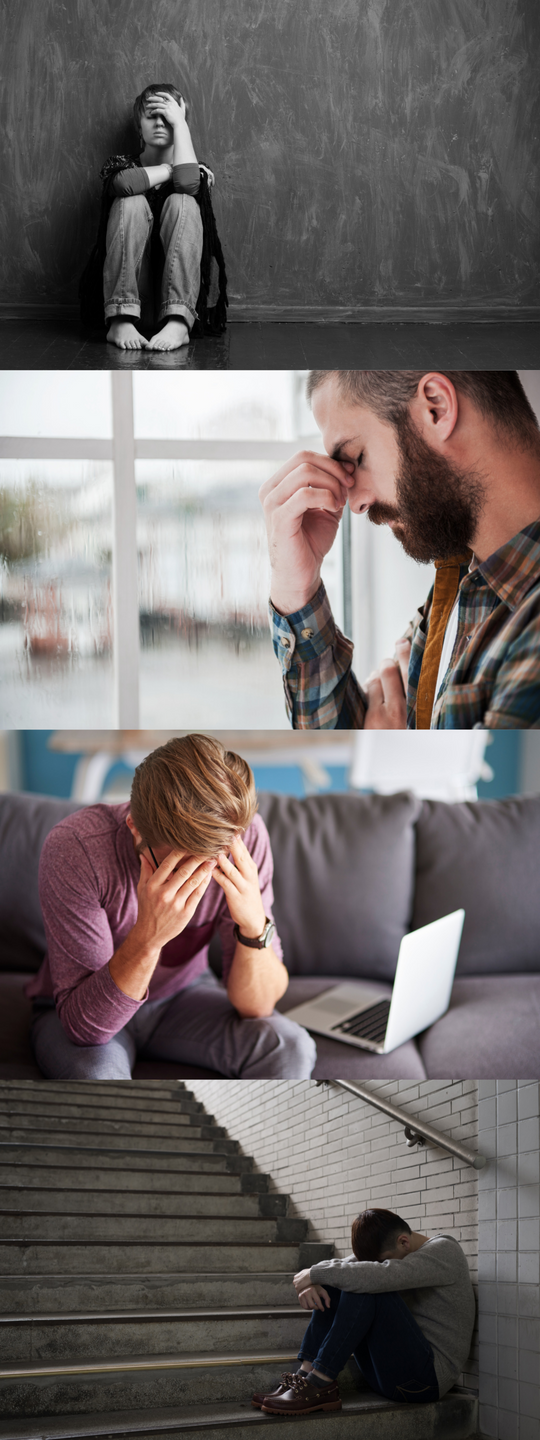
Meanwhile, at the other end, there is The Anxiety Master, who are far along in their anxiety journey.
Anxiety Masters experience anxiety attacks very differently when they have them.
They have a variety of well-honed skills, knowledge about anxiety,
and confidence in their ability to do whatever they want to do in life,
no matter how scary.
At this stage in their journey, they view anxiety differently.
It’s not as threatening, so it’s not something to put energy into avoiding or worrying about.
They know what it is and know they can deal with it.
Their experience of an anxiety attack may look more like this,
“One moment, I’m having some high anxiety...
This situation has brought up some threatening predictions for my midbrain,
I’m going to lean into this and we can keep going with our conversation in a couple of minutes.”
As you can see, a pretty radical difference in how we can experience an anxiety attack.
Now if the way the Anxiety Master responded to an anxiety attack seems way out there...
An unrealistic, unreachable way to approach anxiety attacks.
Or you’d love to be there, at this Anxiety Master stage, but feel nowhere near there currently…
Know that there are steps in between.
What’s important is to take the next step.
This requires decisiveness.
It requires us to make a decision, to brave trying and failing.
We call this person - The Decider.
Deciders live by the adage that continuing to do the same thing expecting a different result is insanity, and are willing to try something new.
They have decided to do something, to take a step forward, and are generally searching for the right process to facilitate their growth.
The process for getting through anxiety needs to be structured in a way that takes you through the different stages, from Distressed to Anxiety Master.
That’s why we created The Domino Process.
To domino your anxiety stage by stage, in a way that builds on the last step to create momentum.
There are 5 stages to our anxiety journey:
- The Distressed
- The Decider
- The Regulator
- The Challenger
- The Anxiety Master
If you want to learn more about these and figure-out where you are on your own anxiety journey, click this link to get your free ‘Anxiety Journey Guide’.

What causes anxiety attacks?
Could they just suddenly strike anyone, or are they more of a medical condition that you’re born with?
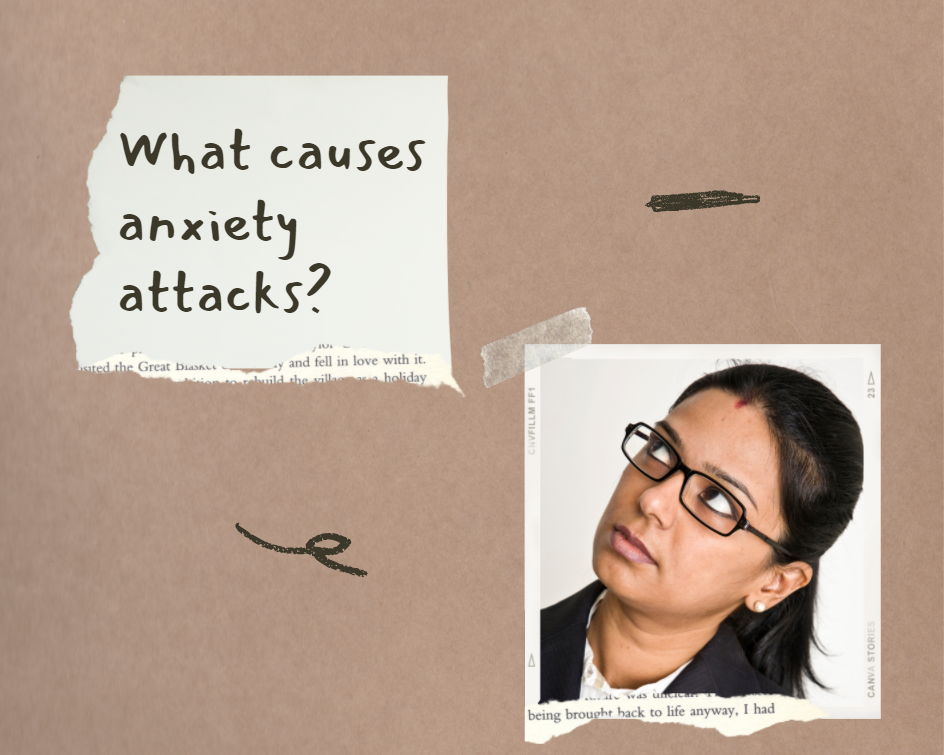
In this section, I’m going to answer this question and at the end I’m going to answer a deeper question your unconscious mind is asking that you may or may not even realize and that answer has the power to shift the way you see yourself and your anxiety.
We’ll break down causes into immediate triggers that set-off the anxiety and risk-factors that make it more likely that someone would struggle with these.
I think it’s going to be helpful if we talk about anxiety attacks and panic attacks, as there’s a fair bit of cross-over here.
Anxiety can be mild, moderate, or severe.
For example, anxiety may be happening in the back of your mind as you go about your day-to-day activities.
Anxiety attacks will always be severe.
And Panic attacks will be even more severe and disruptive.
An anxiety attack will typically be related to something identifiable, that’s stressful or threatening.
Panic attacks aren’t always cued by obvious stressors, like having a deadline looming at work.
Fairly often they seem to occur out of the blue and they usually come on very abruptly.
Whereas anxiety can build gradually.
During a panic attack, the body’s autonomous fight-or-flight response takes over and the physical symptoms are often more noticeable and intense than with non-panic-based anxiety.
Which typically leads to more worries or fears about having another attack.
This can affect behaviour, leading people to avoid places or situations where they think they might be at risk of a panic attack.
Someone may have a panic attack while stuck in traffic and subconsciously fear that being in traffic again will trigger another one.
So they avoid driving at peak traffic times, or stop driving entirely…
...and avoidance breeds anxiety.
This creates an ongoing “cause” of panic attacks.
But more on that later.
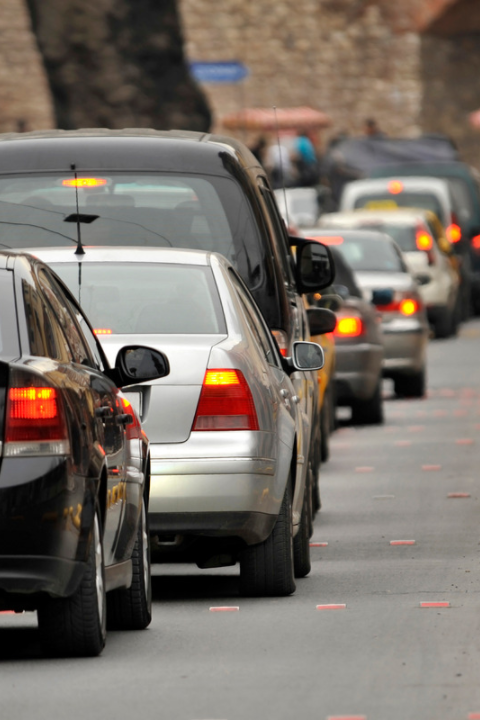
If you know someone who's struggling with high anxiety or panic and aren't sure how to help, check out this Matrix-themed video on exactly that:
Let’s have a talk about immediate triggers that set-off the anxiety.
Panic attacks can be completely unexpected and seem to have no identifiable triggers.
But anxiety attacks and panic attacks can be triggered by similar things.
- a stressful job
- driving
- social situations
- crowded or enclosed spaces, like restaurants, cinemas and churches
- heights
- reminders or memories of traumatic experiences
- symptoms from physical illnesses: such as heart disease, diabetes, irritable bowel syndrome, or asthma
- chronic pain
- withdrawal from drugs or alcohol
- caffeine
- medications
Just some examples of potential things that can trigger-off anxiety and panic attacks.
These trigger the anxiety spike in that moment, but what about risk-factors that make it more likely that someone would struggle with anxiety or panic attacks?
Certain personal factors and experiences that make you more vulnerable to struggling with high anxiety.
These are things like:
- experiencing trauma or witnessing traumatic events, as a child or as an adult
- experiencing stressful life events, such as the death of a loved one or a separation
- experiencing ongoing stress and worries, such as work responsibilities, conflict in your family, or financial difficulties
- living with a chronic health condition or life-threatening illness
- having a reactive, avoidant or unadaptive temperament
- having close family members who also have anxiety or panic disorders
- the use of drugs or alcohol to avoid unwanted emotions
None of these mean someone will experience a panic or anxiety attack.
They only increase one’s risk of struggling with these.
And I don’t want you focussing too much on these, as you can’t undo your past to scrub out these risk factors.
And you don’t need to!
Having anxiety or panic attacks doesn’t doom you to continuing to have them.
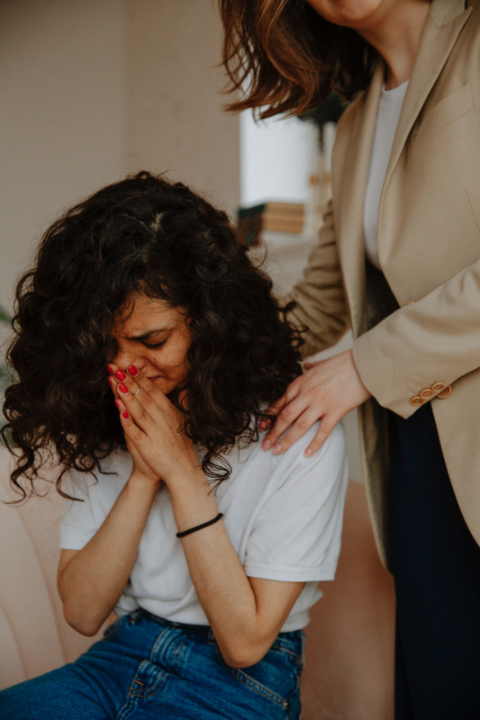
Remember earlier how I said we’d come back to ongoing causes of panic attacks?
Whenever there’s an issue, they’ll be thoughts, beliefs and behaviours that maintain it.
If you change those, the issue reduces or stops.
Now with panic, beliefs form that certain adrenal sensations, like rapid breathing or heart palpitations are signs of danger.
We’re dying, going crazy, or about to be super embarrassing.
The fascinating thing about this as a maintaining factor, is that we don’t think of looking at internal triggers, so the panic seems out of the blue. Totally unpredictable.
We look at the situations we’re in…
No seeming correlation.
What we ate…
Who we’re with…
Doesn’t seem to match.
"Sometimes I panic, sometimes I don’t."
The triggers are internal!
They’re sensations.
When we’re having an issue with panic, the brain becomes hypervigilant to panic symptoms.
It keeps an eye-out for heart rate and breathing changes,
Blood pressure and muscular tension.
When it notices a shift…
an upswing in adrenal activity.
It sends a danger signal.
Now unfortunately, this just activates fight and flight, and releases more adrenaline.
Which is called a panic cycle and is why panic attacks get so intense.
They’re a self-feeding cycle.
Address that cycle though, and you sort the panic issue.

Becky’s created a simulation of exactly what this can be like in this video.
Warning: also contains depression and suicidality.
Anxiety Attacks don’t work quite the same way.
There is a more obvious trigger for these typically.
Like heights, traffic, or the potential for social rejection.
It could be anything really.
It’s just that the level of the anxiety gets very very high.
So high, that it feels like you’re being attacked.
Which is really distressing.
And like with the panic, most people try to avoid feeling this way again.
But it keeps coming up.
Over and over again.
At the beginning of this section I said there was a deeper question, and it may be conscious or unconscious…
Most people struggling with attacks. Whether anxiety attacks or panic attacks, are asking themselves…
“Is this just who I am? Or are there things I can do to stop having these attacks?”
“Am I powerless?”
They feel pretty overwhelming. So it’s easy to believe there’s nothing we can do about them.
But I will tell you now, there is a process our clients have followed to reduce and even eliminate anxiety and panic attacks.
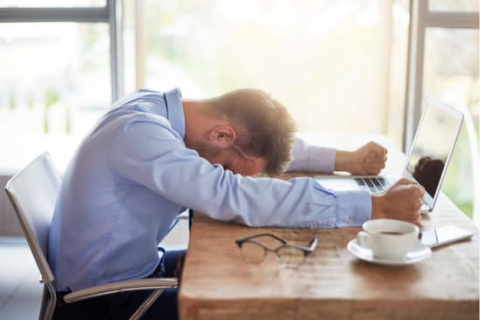
If you’re a decider…
If you’re committed to doing something about your anxiety, you’re just not sure what that something is…
Then keep reading.
In the next section I’ll cover treatment for anxiety attacks and panic attacks and the process that can be followed to move through them.
So stay tuned and read on.
Treatment for anxiety attacks
How do you calm an anxiety attack? How to calm anxiety attack. Anxiety attack help. Anxiety attack treatment, panic attack treatment, treatment for anxiety attacks, panic attack what to do, how to stop an anxiety attack, anxiety treatment at home, how to stop anxiety attack, how to calm anxiety attack, panic attack help, anxiety attack help, stop anxiety attack now, anxiety attack how to help, anxiety attack what to do, anxiety attack cure, how to treat anxiety attacks, anxiety attack how to stop, anxiety attack relief, dealing with anxiety attacks, how to treat anxiety attacks without medication, how to treat anxiety attacks at night, how to treat anxiety attacks naturally, how to cure anxiety attacks, how to cure anxiety attacks fast, how to treat anxiety and panic attacks, Anxiety medication, medication for panic attacks, Medication for anxiety attacks, medicine for anxiety attacks, effective medication for panic attacks, best medication for panic attacks and anxiety, best medication for panic attacks,
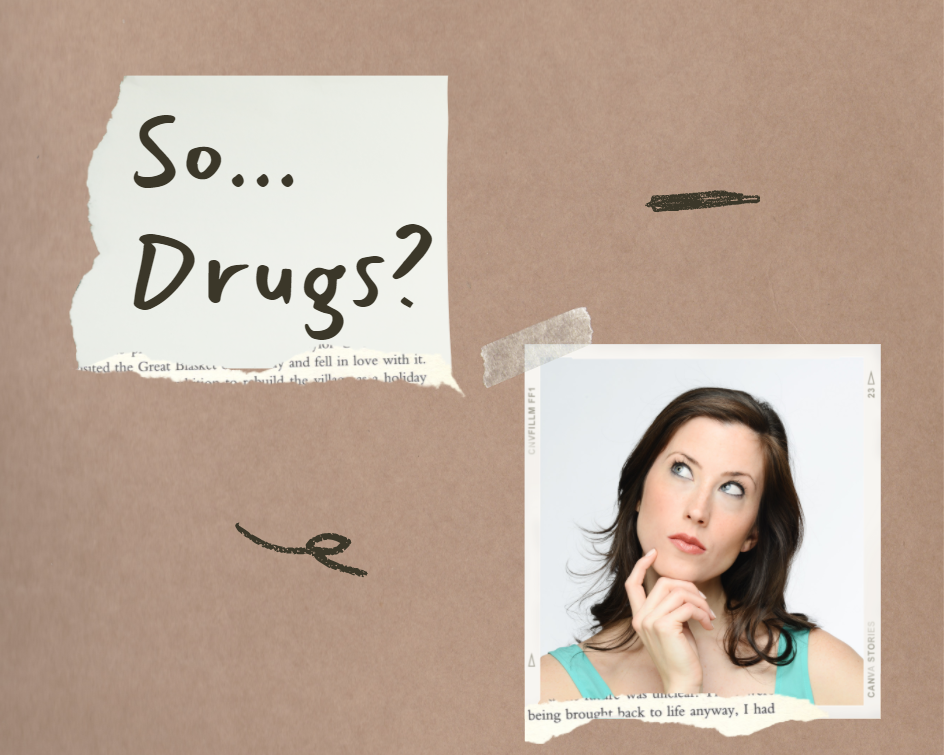
Let’s first talk about the elephant in the room – Drugs.
Many people have tried drugs to reduce their anxiety.
Prescribed ones and not so prescribed ones.
Some people have been on them for a while, some are considering them, or have just started using them.
Drugs can be used to dampen the central nervous system, or even reduce adrenal signals.
But this is only a bandaid approach.
Think about it…
How many people have you heard of who used drugs to cure their panic and came off them to enjoy their anxiety-free life?
Similar to if you had a movement you kept doing that was causing pain, and you dealt with it with painkillers.
You know that’s it for you… you’re going to be on those painkillers for life.
It’s pretty disempowering, and frankly, not very research-based.
You’ll notice that a lot of the recommendations will cover using drugs and psychological therapy.
Research shows that tackling anxiety from a psychological angle is incredibly effective.
We throw the drugs into the package because, as a society, we’re quite uncomfortable with discomfort.
There’s plenty of studies demonstrating that they actually get in the way, as they’re just another way of trying to run away from the anxiety or avoid it…
and avoidance breeds anxiety.
It’s waiting right there for you when the drugs wear off, or become less effective over time due increased tolerance.

Which brings us to Psychological Therapy.
What you need for effective Psychological Therapy is a proven, effective process that you can follow to retrain your brain out of panic and empower yourself with skills that work with anxiety.
Something that can take you from distressed, into the relief of anxiety regulation, through Challenger territory, where you gain your life back, and then finally help you transform into an Anxiety Master.
Becky covers how effective this kind of process can be in overcoming anxiety in these 3 videos here.
- First time alone in a movie exposure walkthrough
- Flight panic exposure
- Panic in a crowd exposure
How to calm an anxiety attack right now
Often people are keen to see their anxiety gone pronto. So you may be wondering how long this process takes.
Well, if you’re motivated it can take as little as 6 weeks if you’re willing to work on it every day.
Some people worry about having another attack any moment and want something that stops anxiety attacks now.
So, if you’re wanting to know how to calm an anxiety attack right in that moment.
Then here are my Top 3 Distress Tolerance Techniques:
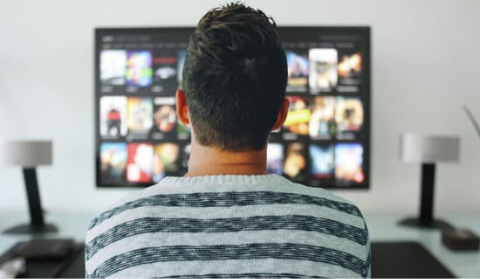
Distraction
If you can, find something really engaging to watch, or read, or do with your hands.
Or call a friend.
Different people find different things work best.

Dramatic change of body state
Have a really cold shower. Put an icecube down your back.
Splash water on your face.
Or go for a sprint.
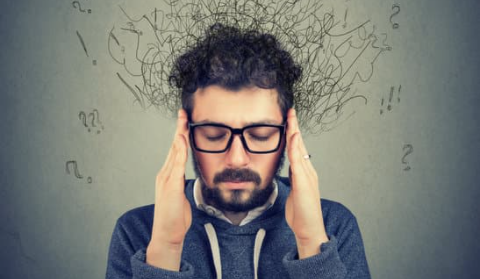
Get mindful
Don’t worry, this isn’t the super meditative kind.
I’m talking about emergency mindfulness, grounding yourself immediately into the present moment.
Here’s what you do:
List 5 things you can see around you.
Then 5 things you can hear, then touch, taste and smell.
Then 4 of each. 3, 2 and 1.
By the time you’re done with running through that, you’ll be on the downward slope of the attack.
Any of these will unhook you from the thought-spiral causing the anxiety or panic attack and help you get through that one spike of adrenaline.
Those will help you for now.
But I know how tedious it is to have to keep doing these - feeling at the whim of your anxiety.
So if you’re sick of that too, there is a process that can be followed that gets people out of anxiety and panic attacks.
Your best next step is get our free Anxiety Reducer Guide.
This guide covers the core causes of anxiety and how to get started on the step-by-step process that gets people serious results.
The most effective and efficient way of treating your anxiety, backed by serious research.
Get The Anxiety Reducer GuideThanks for joining me for this guide to anxiety and panic attacks.
I do hope it helps you on your anxiety journey.
Michael Burrows
Anxiety Specialist
P.S. You can get a free preview of our flagship panic course, that will take you step by step from Panic to Peace.
You can get this full panic treatment course as an epic bonus when you join Anti-Anxiety Academy, our powerful anxiety-reducing membership.
Warning: the clip did make Becky cry as it challenges some of the negative assumptions people with anxiety can hold about themselves.








